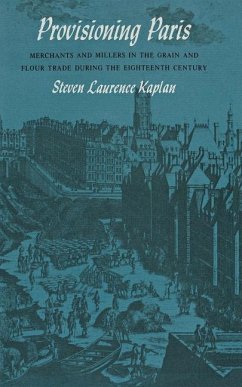Dependence upon grain deeply marked every aspect of life in eighteenth-century France. Steven Kaplan focuses upon this dependence at the point where it placed the greatest strain on the state, the society, and the individual-on the daily supply of grain and flour that furnished the staff of life. He reconstructs the history of provisioning in pre-industrial Paris and provides a comprehensive view of a culture shaped by the subsistence imperative.
Who were the agents of the provisioning trade? What were their commercial practices? What sorts of relations did they maintain with each other? How did the authorities regulate their business? To answer these questions, Professor Kaplan combed the archives and libraries of France. He maps out the elementary structures of the trade and shows how they were transformed as a result of cultural and political as well as commercial and technological changes. In rich ethnographic detail he evokes the dayto-day life of merchants, millers, bakers, brokers, and market officials. He shows how flour superseded grain and how the millers overtook the merchants in the provisioning process. He explores the tension between the suppliers' need for freedom and the consumers' need for security. Even as he weaves the intricate patterns of life inside and outside the marketplace he never loses sight of the immense interests at stake: the stability and legitimacy of the government, the durability of the social structure, and the survival of the people.
Who were the agents of the provisioning trade? What were their commercial practices? What sorts of relations did they maintain with each other? How did the authorities regulate their business? To answer these questions, Professor Kaplan combed the archives and libraries of France. He maps out the elementary structures of the trade and shows how they were transformed as a result of cultural and political as well as commercial and technological changes. In rich ethnographic detail he evokes the dayto-day life of merchants, millers, bakers, brokers, and market officials. He shows how flour superseded grain and how the millers overtook the merchants in the provisioning process. He explores the tension between the suppliers' need for freedom and the consumers' need for security. Even as he weaves the intricate patterns of life inside and outside the marketplace he never loses sight of the immense interests at stake: the stability and legitimacy of the government, the durability of the social structure, and the survival of the people.
Dieser Download kann aus rechtlichen Gründen nur mit Rechnungsadresse in A, D ausgeliefert werden.









